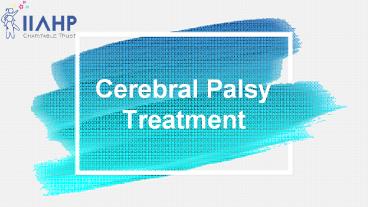Cerebral Palsy Treatment - PowerPoint PPT Presentation
Cerebral Palsy Treatment
Treatment for Cerebral Palsy helps in controlling the symptoms with the help of therapies such as behavioral therapy and speech therapy. – PowerPoint PPT presentation
Title: Cerebral Palsy Treatment
1
Cerebral Palsy Treatment
2
What is Cerebral Palsy Treatment
Cerebral palsy (CP) is a neurological disorder
that affects the movement of a child, motor
skills and muscle tone. In most cases, cerebral
palsy is caused by brain damage, which develops
while the child is still in the utero or during
shortly after birth.
3
Therapies For Cerebral Palsy Treatment
- Therapy, provided in different forms, helps
people with cerebral palsy with mental, physical,
social and educational benefits. If it is started
early after the diagnosis, then many forms of
therapy for CP can reduce impairment and the risk
of developing other conditions related to
Cerebral Palsy in Children.
4
Cerebral Palsy Types
There are different types of Cerebral palsy
- Spastic Cerebral Palsy
- Dyskinetic Cerebral Palsy
- Ataxic Cerebral Palsy
- Hypotonic Cerebral Palsy
- Mixed Cerebral Palsy
5
Cerebral Palsy Causes
- In some cases, the cause of cerebral palsy
remains unknown. However, research suggests that
disorder can occur during pregnancy when the
childs brain is not properly developed or
damaged. Brain damage can be caused by usual
maternal illnesses and diseases, genetic factors
or illegal drugs, while cerebral palsy may also
occur during childbirth.
6
Cerebral Palsy Symptoms
Symptoms of Cerebral Palsy in Children
- Low or high muscle tone resulting in floppiness
or tightening. - Stiffness or tightness of muscles.
- Unable to hold their own head when lying on
stomach or in a supportive sitting position. - Muscle spasms.
- Poor muscle control and posture.
- Delayed development.
- Difficulty in feeding or swallowing.
- Prefer to use one side of their body.
7
Contact US 0172-4002556, 91-9780295562,
91-8054977616 Website IIAHP Therapy Center
8
(No Transcript)
PowerShow.com is a leading presentation sharing website. It has millions of presentations already uploaded and available with 1,000s more being uploaded by its users every day. Whatever your area of interest, here you’ll be able to find and view presentations you’ll love and possibly download. And, best of all, it is completely free and easy to use.
You might even have a presentation you’d like to share with others. If so, just upload it to PowerShow.com. We’ll convert it to an HTML5 slideshow that includes all the media types you’ve already added: audio, video, music, pictures, animations and transition effects. Then you can share it with your target audience as well as PowerShow.com’s millions of monthly visitors. And, again, it’s all free.
About the Developers
PowerShow.com is brought to you by CrystalGraphics, the award-winning developer and market-leading publisher of rich-media enhancement products for presentations. Our product offerings include millions of PowerPoint templates, diagrams, animated 3D characters and more.































